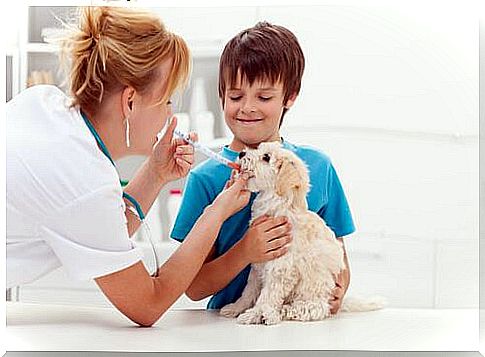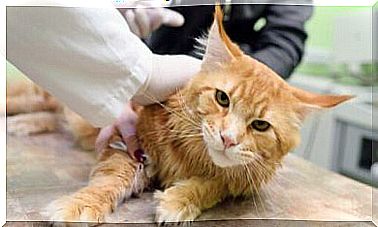Can Antibiotics Be Given To Animals?

Is it possible to administer antibiotics to animals? These are widely used medicines to treat diseases caused by bacteria.
There are many types that can be used to control and fight various infections.
Below, we will tell you if antibiotics can be given to animals and the precautions to be taken with this type of medication.
How do antibiotics work in the body?
Antibiotics are chemotherapy drugs. That is, their therapeutic action is based on the chemical interactions they generate in the patient’s body.
Their chemical action acts to control reproduction or to eliminate bacteria that cause an infectious process.
For this reason, these drugs are not effective in fighting diseases caused by other microorganisms, such as a virus or fungi.
Selective antibiotics vs broad spectrum antibiotics
Existing antibiotics are classified into two large groups according to their action in the body: selective and broad spectrum.
- Selective antibiotics: they are those that act only in front of certain bacteria. Therefore, their action is selective and is effective in treating diseases caused by certain types of bacteria.
- Broad-spectrum antibiotics: These drugs work against a large variety of bacteria. Their action covers a broad spectrum and can be used to treat diseases associated with more than one type of bacterium.

If we look at an antibiotic as a whole, we can identify the main drug that acts on the bacteria. Despite this, the addition of other chemical compounds that enhance the antibiotic action is also frequent.
A classic example is clavulanic acid, which is accompanied by amoxicillin in most commercial antibiotic drugs.
Although not an antibiotic, this chemical compound enhances the action of amoxicillin, which optimizes treatment.
When can antibiotics be given to animals?
Logically, antibiotics can be given to an animal when it is suffering from some kind of infectious process caused by bacteria.
But before giving it to him, the diagnosis of a disease of bacterial origin must be confirmed.
Frequently, the symptoms of a viral infection can be confused with those of a bacterial one.
For this reason, a consultation with a veterinarian is essential before giving your pet an antibiotic.
Each furry friend is unique, with a singular organism, so there is no single effective treatment for all patients. Only a professional will be able to verify the cause of the symptoms presented by your pet and determine a treatment based on his needs.
Also, vets usually prescribe antibiotics after surgery. This prevents skin lesions or scars from becoming infected during healing.

At the same time, treatment with antibiotics may be required in case of flea, tick or mite infestations.
In eliminating these ectoparasites, small lesions in the skin must be prevented from becoming infected as they heal.
Why don’t you have to self-medicate animals?
Unfortunately, many owners give antibiotics to their pets without the prior approval of a veterinarian. Despite this, self-medication is very dangerous and not recommended.
Not all medicines suitable for humans can be used on animals, and vice versa.
Furthermore, the doses and the frequency of administration must always be determined by a veterinarian, as they depend on the reason for use and the organism of the animal. For example, your weight and health should be considered to determine effective and safe treatment.
Inappropriate or excessive use of antibiotics could cause your furry friend various side effects, such as diarrhea, vomiting and intoxication.
Antibiotics to animals: tips for safe treatment
- Only give your pet antibiotics with the prior approval of a veterinarian.
- Provide him with a comfortable, safe and positive environment to help him recover.
- Consult your veterinarian on the use of probiotics to prevent imbalance in the intestinal flora during treatment with antibiotics.
- Offer adequate preventive medicine to your animals throughout their life, with visits to the vet every 6 months and always respecting the schedule of vaccinations and pesticides.









